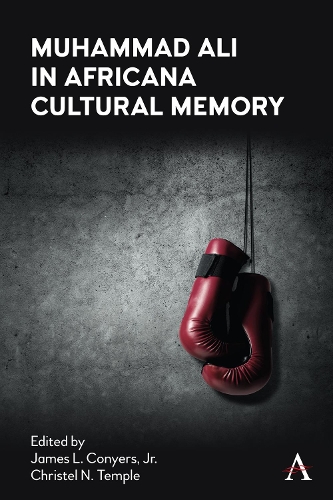
Muhammad Ali in Africana Cultural Memory
(Paperback)
Available Formats
Publishing Details
Muhammad Ali in Africana Cultural Memory
By (Author) James L. Conyers
Edited by Christel N. Temple
Anthem Press
Anthem Press
14th May 2024
United Kingdom
Classifications
Professional and Scholarly
Non Fiction
Ethnic studies / Ethnicity
305.896
Physical Properties
Paperback
268
Width 153mm, Height 229mm, Spine 21mm
454g
Description
One critical priority of the discipline of Africana studies is applied memory, specifically, how the record of the cultures survival and agency reveals usable and reproducible knowledge and behavior. In terms of how Muhammad Ali, as an historical actor, has left an heroic legacy that bequeaths to us a sort of inheritance, the critical task at hand is to systematically explore this historical actors life, feats, philosophy, grit, worldview, and even his folkloric antihero to decipher his Africana cultural memory value. At the core of this edited collection is a commitment to enhance the cultural storytelling about Muhammad Ali and to critically itemize the lessons we garner from his life as allegory. The ancestral life is one that is remembered and recalled. The contributors research uncovers Alis local, national, and global encounters that are legacy worldviews. These perspectives give us direction for mining the critical depth of Alis encounters which map his memory in terms of culturally sustaining confidence, self-esteem, reinvention, immortalization, and empathy. These are the fertile seeds of Africana cultural memory which bloom into powerful markers and monuments of an epic life of hyperheroic activity relevant to cultural memory, sports, history, politics, health, and aesthetics.
Reviews
An anthology exploring the life, significance, and influence of Muhammad Ali is exciting. Ali has largely been framed as the greatest fighter ever to grace the ring and undeniably a cultural icon. However, such a simplistic narrative undermines Ali as the greatest athlete social activist in history rooted in the best of Africana cultural and political traditions. This anthology seeks to frame Ali as a complex and multi-faceted personality who has had one of the most profound impacts on social justice movements in the United States. Dr. Adisa Alkebulan, San Diego State University, US
Muhammad Ali in Africana Cultural Memory succinctly describes how Ali challenged white hegemony in the sporting community and in the broader national and international arena. It explains how Ali defined social norms and fought for boxing championships as well as the right for self-actualization by crafting a highly intelligent theatrical presentation of self in and out of the ring. The book reminds us of Black Hope, cultural pride and the courage to help navigate the challenges that the intersection of life with race presents. That like Ali we can defend our rights to breathe and float like a butterfly and sting like a bee. Theresa Rajack Talley, Dalhousie University, Canada
Author Bio
James L. Conyers, Jr., is Director of the African American Studies Program, Director of the Center for African American Culture, and University Professor of African American Studies at the University of Houston.
Christel N. Temple is Professor of Africana Studies at the University of Pittsburgh. She specializes in cultural memory and Pan-Africanism and has authored Black Cultural Mythology, Transcendence and the Africana Literary Enterprise, and Literary Pan-Africanism: History, Contexts, and Criticism.
